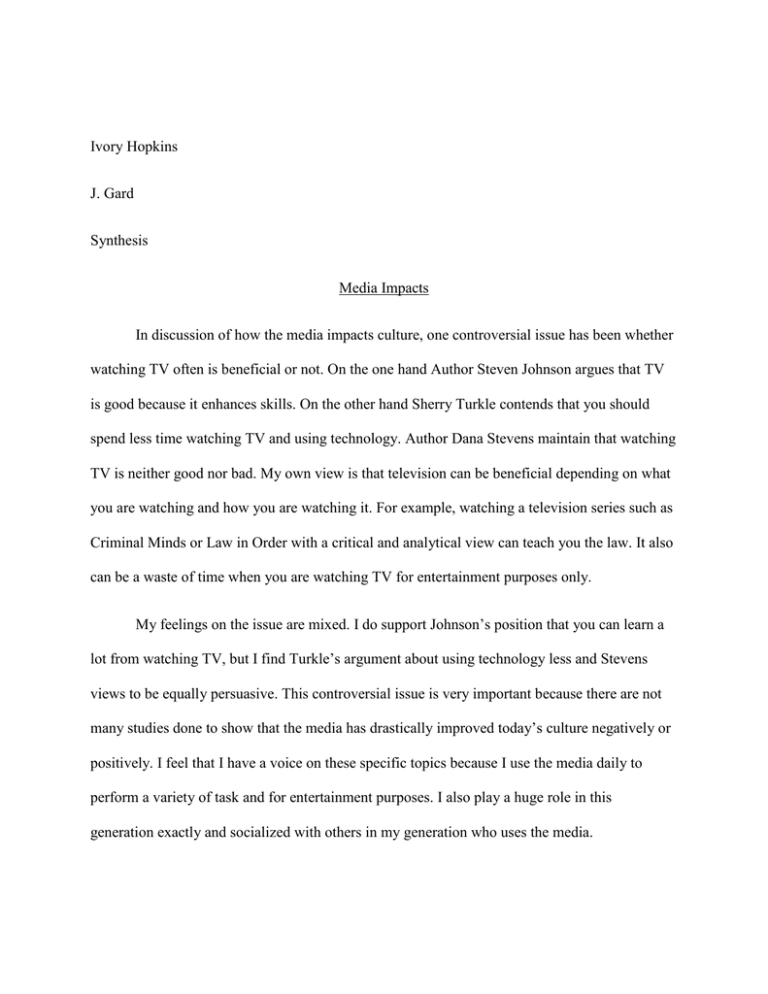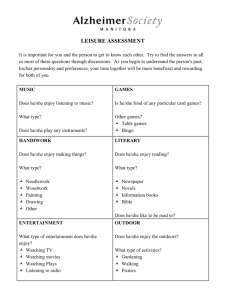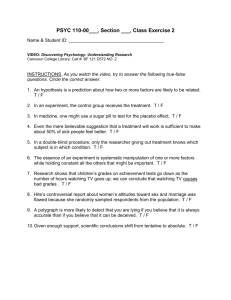Synthesis Paper
advertisement

Ivory Hopkins J. Gard Synthesis Media Impacts In discussion of how the media impacts culture, one controversial issue has been whether watching TV often is beneficial or not. On the one hand Author Steven Johnson argues that TV is good because it enhances skills. On the other hand Sherry Turkle contends that you should spend less time watching TV and using technology. Author Dana Stevens maintain that watching TV is neither good nor bad. My own view is that television can be beneficial depending on what you are watching and how you are watching it. For example, watching a television series such as Criminal Minds or Law in Order with a critical and analytical view can teach you the law. It also can be a waste of time when you are watching TV for entertainment purposes only. My feelings on the issue are mixed. I do support Johnson’s position that you can learn a lot from watching TV, but I find Turkle’s argument about using technology less and Stevens views to be equally persuasive. This controversial issue is very important because there are not many studies done to show that the media has drastically improved today’s culture negatively or positively. I feel that I have a voice on these specific topics because I use the media daily to perform a variety of task and for entertainment purposes. I also play a huge role in this generation exactly and socialized with others in my generation who uses the media. In the essay “Watching TV Makes You Smarter” author Johnson argues that you can most definitely benefit from the media by watching television. He claims that movies and television shows often have confusing plot line and morals, as well as using the World Wide Web for a serious of complicated tasks. The confusing plot lines and tasks will enhance important skills such as critical thinking, managing resources, and decoding complex technology waves. Johnson also implies that you will gain new knowledge with your prior knowledge to enhance your common sense level by thinking a lot during this state of confusion. Johnson says that, “To make sense of an episode of 24, you have to integrate far more information than you would have a few decades ago watching a comparable show” (214). Basically, he wants to make the point that watching TV is far beyond just looking at pictures and text. You actually have to think beyond what you see and interpret things differently from what they use to be. He further elaborate by saying that, “ To keep up with the entertainment like 24 you have to pay attention, make inferences, and track shifting social relationships”(215). Johnson focus is to show that paying close attention to details and morals in stories keeps you actively engage in television shows. Johnson’s final argument is that children who watch TV are forced to think with a mature mindset like adults while adults often learn from their children when it comes to change with advances in technology. Although many people enjoy the entertainment of technology, one author Turkle feels that using technology a lot is not as useful in the essay “Can You Hear Me Now?” Also that technology has influenced people in society so much that they are having a hard time determining what actually matters to them and that people are interacting with each other less in person and more on social networks. Turkle says that, “One says, I don’t have enough time alone with my mind”, another, “I artificially make time to think,” To keep up with the entertainment like 24 you have to pay attention, make inferences, and track shifting social relationship”(274). This proves that people spend so much time using technology gadgets that they don’t focus on themselves because they are too busy to take time to relax and leave technology alone. Turkle also wants to make the point that a lot of things people used to do in person such as greeting each other, having face-to-face interactions, and just giving out your information is done differently. Now, that technology is useful and became available to more people in society, people rather use phone and the internet to do these things. For example, intend of people going to a place of business and ask if they are hiring. People now can just go online and see if they hiring as well as complete an online application for employment. Turkle feels that since technology is blooming and is being used so often, people find time to abuse it. Basically, people used technology way more than they should. In author Stevens essay “Thinking Outside the Idiot Box” she argues how technology is changing and evolving but not making people stupid or smarter. Although she never directly took a firm stance she still objects to Johnson’s argument that watching TV makes you smarter. Stevens also says that,” I’d participate in the experiment myself, but in my case, watching television is definitely a smart thing to do- I get paid for it” (234). Steven is neutral because she does not think it is good or bad. She feels Johnson has a few flaws in his argument but she still understand what he is saying. Stevens says, “ If watching TV really makes you smarter, as Steven Johnson argued in an article in yesterday’s New York Times Magazine ( an excerpt from his forthcoming book) then I guess I need to watch a lot more of it, because try as I might, I could make no sense of Johnson’s piece”(231). She partially agrees with Johnson and Turkle argument as well. Stevens agrees with Turkle argument that less time should be spent using technology but feels that Turkle does not understand the advances of technology and how it is so useful in society and the media culture. Stevens states that, “There could be a better time to test Steven Johnson’s theory than National TV Turnoff Week- just turn off the set till Sunday and see if you get dumber” (234). Basically, she is saying that TV watchers should try turning the TV off for a week to see if they get dumb. She is directly addressing Johnson argument and thinks that you can learn best by testing out Johnson’s theory. Steven is responding to Johnson essay to prove that his argument on watching TV makes you smarter are not true and can’t be proven. Stevens is saying that although people benefit from the media, they are not becoming dumb either. In Turkle argument on that people should use technology less because its influencing culture through the media negatively does not have proof either. Steven’s argument against Turkle is that the media can be extremely helpful to today’s culture although it’s used often which is not bad at all. Basically, if you have some that you enjoy and helps you then used it in your favor or to your advantage. My view is the issue is still neutral. I feel as if watching TV does not make you dumb but can but can enhance your critical thinking skill depending on how you watch it. I agree with Turkle argument that you should watch TV less because watching TV a lot could be quite boring in a waste of time. You could miss out on a lot of important opportunities by watching TV a lot such as opportunities to make money and meet new people. Turkle argument is fair because people do use technology so much that it is starting to get out-of-hand. For example, these days’ people tend to answer cell phone calls in the middle of an important conversation between two people. Honestly, I feel technology is starting to make people become ruder when it comes to answering calls and responding to text messages. In each of the essays the authors were credible as to what they had to say and their positions on the issue. They all were entitled to their opinions and took a good approach in how they address their position on the topic. Author Johnson and Turkle wrote several books on topics similar to this one. I feel Author Stevens is much more credible in her sources because she has a Ph. D in comparative literature from the University of California in Barkley. Works Cited Johnson, Steven. “Watching TV Makes You Smarter.” They Say, I Say with Readings. Eds. Gerald Graff, Cathy Birkenstein, and Russel Durst. Norton & Company: New York 2009. Print Stevens, Dana. “Thinking Outside the Idiot Box.” They Say, I Say with Readings. Eds. Gerald Graff, Cathy Birkenstein, and Russel Durst. Norton & Company: New York 2009. Print. Turkle, Sherry. “Can You Hear Me Now?” They Say, I Say with Readings. Eds. Gerald Graff, Cathy Birkenstein, and Russel Durst. Norton & Company: New York 2009. Print



